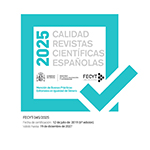Los nombres de los mudéjares estudiados de nuevo a partir de los casos de Toledo y Lisboa
Resumen
Análisis lo más completo posible de los nombres de mudéjares que aparecen en la documentación castellana y portuguesa de Toledo y Lisboa de los siglos XIV y XV. El examen de los diferentes elementos constitutivos del nombre, tanto masculino como femenino, muestra que ni los nombres propios ni la indicación de filiación reflejan una aculturación al medio cristiano -aunque existió en una medida que es preciso matizar- sino que hubo fidelidad a los fundamentos islámicos y a la tradición genealógica árabe. A veces es posible, sobre todo si se trata de miembros de la élite mudéjar, reconstruir nombres árabes completos, lo que muestra la resistencia de los interesados a la aculturación y la voluntad de fidelidad a los parámetros árabes clásicos, detrás de la apariencia de conformidad al modelo cristiano dominante.
Descargas
Descarga artículo
Licencia
La revista En la España Medieval, para fomentar el intercambio global del conocimiento, facilita el acceso sin restricciones a sus contenidos desde el momento de su publicación en la presente edición electrónica, y por eso es una revista de acceso abierto. Los originales publicados en esta revista son propiedad de la Universidad Complutense de Madrid y es obligatorio citar su procedencia en cualquier reproducción total o parcial. Todos los contenidos se distribuyen bajo una licencia de uso y distribución Creative Commons Reconocimiento 4.0 (CC BY 4.0). Esta circunstancia ha de hacerse constar expresamente de esta forma cuando sea necesario. Puede consultar la versión informativa y el texto legal de la licencia.
La revista En la España Medieval no cobra por tasas por envío de trabajos, ni tampoco cuotas por la publicación de sus artículos.












